Self-medals, hot chips and Olympic qualification: a day at Australia’s athletics titles
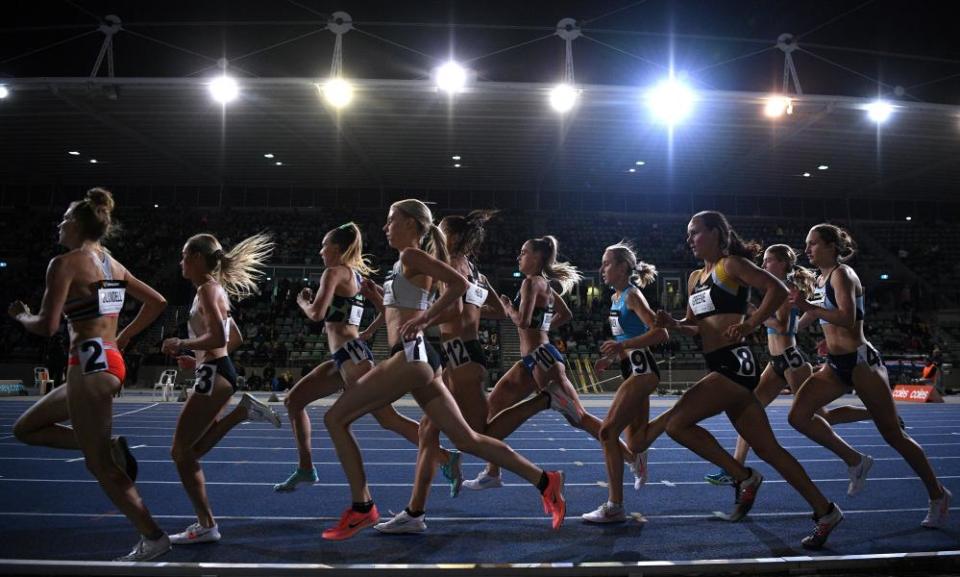
A cloud of Covid-induced uncertainty still lingers over Tokyo 2021, but there was no talk of Olympic cancellation at Australia’s track and field national championships this week. The seven-day event is the one shot Australian athletes have at guaranteed Olympic selection: provided they have already secured the necessary qualification time, height or distance, the winner of each national title books a ticket to Tokyo. Whatever the noise coming out of Japan, in the minds of these athletes the Games are going ahead in three months’ time.
The championships have special significance for athletes and administrators alike following the turbulence of 2020. The meet comes 13 months after the domestic competition calendar was paused in the early days of the pandemic, with last year’s championships cancelled as a result. Yet thanks to Australia’s successful response to Covid-19, major events returned in January and the country’s best athletes have been in action frequently during recent months. As overseas rivals endure lockdowns and second waves, Australia’s medal hopefuls are benefiting from an uninterrupted preparation for Tokyo.
Related: Citius, altius, virus: it seems absurd, but the Olympic Games must go on | Barney Ronay
Under overcast Sydney skies on Saturday, the pressure is palpable as Olympic dreams hang in the balance. Guardian Australia went trackside to capture all the action.
‘We’re all a big family’
11.56am: Women’s under-15 400m para
Tracey Jones is standing at the start-line, watching the track with a laser focus. When the starter’s pistol shatters the silence, attention in the arena follows four junior para-athletes as they push out from the blocks. But Jones’ focus is elsewhere – an Athletics Australia volunteer, the 43-year-old and several colleagues are responsible for managing the starting line. As soon as the runners round the first bend, Jones is on the track removing starting blocks ahead of the next race.
Jones is one of 160-odd volunteers helping out at the championships, distinct in their black T-shirts and caps. A former runner, Jones has been volunteering as an official for much of the past decade – alongside her day job as a radiographer. In that time, she has helped out at hundreds of events, from local races to the 2018 Commonwealth Games. “You put a lot of money, energy and effort into it,” says Jones, still a bit bleary-eyed after a 5am start to make it to the track from her home in Newcastle. “But it’s worth it – for the people and the athletes. We’re all a big family.”
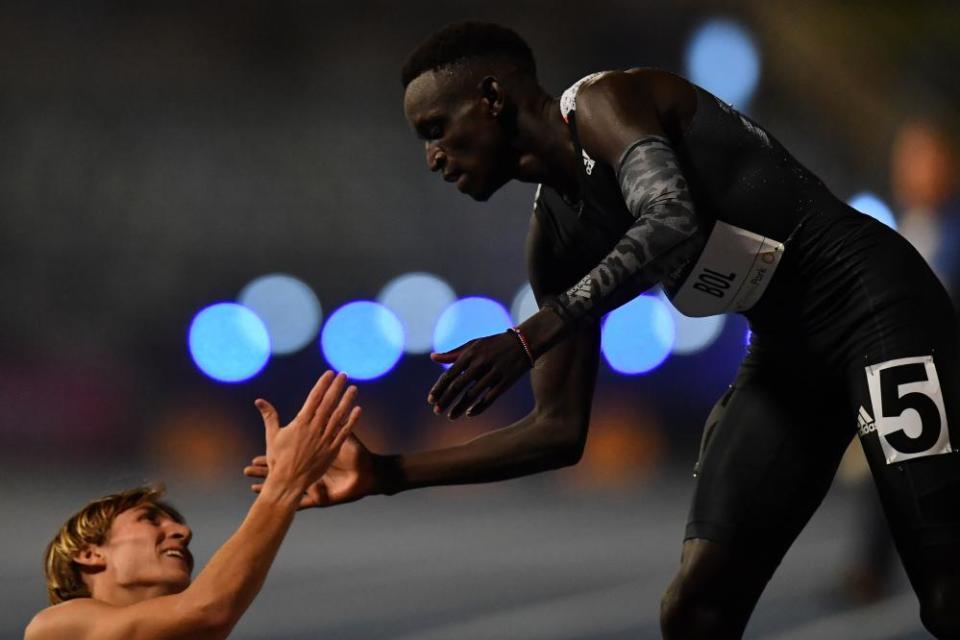
As a mum with a day job, Jones’ schedule only allows her to officiate over the weekend. “They used to require us to be here for the whole event,” she says. “But they have realised they need to be flexible.” Jones is among the youngest officials and one of only a few women, although she thinks the demographic is slowly changing. With the prospect of the 2032 Olympics being hosted in Brisbane, Jones hopes more younger women will volunteer to assist. Certainly, the starting official hopes to be involved come Brisbane. “But getting to big events is only the icing on the cake,” she says. “I have so much fun along the way.”
While Jones is busy preparing for the next race, fellow official John Morris remains alert to the 400m action. A track referee, Morris works alongside a team of a dozen or so umpires dotted around the arena to ensure athletes comply with competition rules. “If an umpire sees something of concern, they fill out an infringement form,” Morris says. “The chief umpire reviews it, before it comes to me for a decision. I can either take no action, issue the athlete with a warning, or disqualify them.”
Morris has been volunteering in athletics since 1988, helping out at the Sydney Olympics and two Commonwealth Games. That experience means Morris is acutely aware of the importance of the day’s action, with Olympic qualification on the line. “I wouldn’t call it pressure,” he says. “But you want to make sure you really get it right. These athletes are doing their best for Australia; you want to help them along in that process.”
‘We’re going to have a really good Games’
4.42pm: Women’s under-17 1500m
Overseeing the action at Olympic Park is Andrew Faichney, Athletics Australia’s bespectacled head of high performance. With Tokyo on his mind, Faichney – a two-decade sports administration veteran – is making the most of the week-long opportunity to catch up with coaches and athletes. “After the past 12 months, it is sensational to be back at the track,” he says. “Some of my colleagues around the world have minimal competition opportunities – for us to have had a domestic season which has only been minimally impacted by lockdown, with this week as the pinnacle, is just fantastic.”
Faichney is confident that the Olympics will go ahead and believes Australia is primed for success on the track and in the field. The combination of a new golden era of talent and the country’s relative lack of public health restrictions, he suggests, leave Australia’s athletes well-placed for Olympic success. “We’ve seen some great performances this weekend and throughout the domestic season,” says Faichney. “I think we’re going to have a really good Games.”
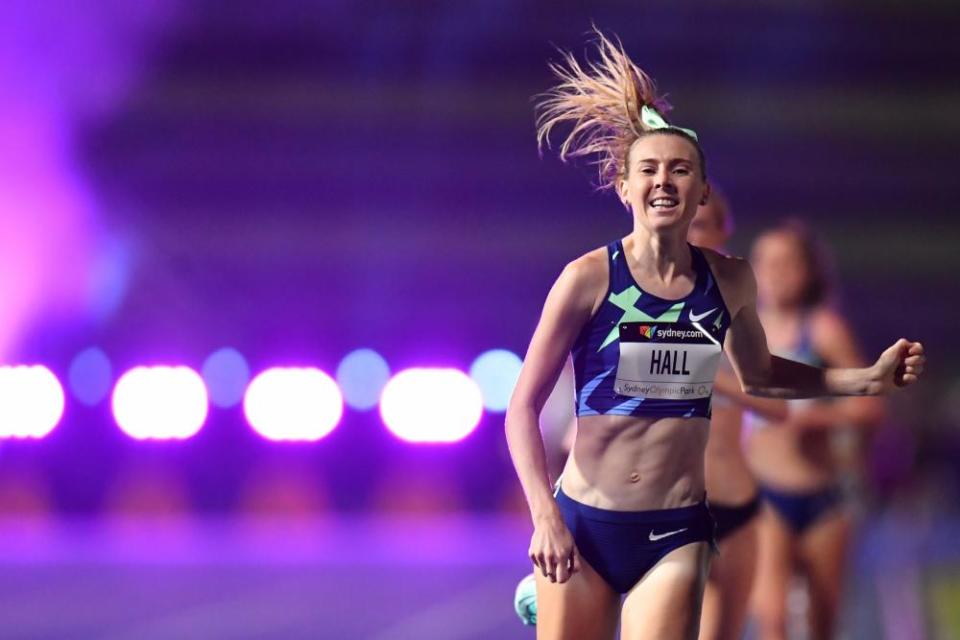
While Tokyo might be imminent, Paris 2024 and Los Angeles 2028 loom on the horizon. The national championships feature both open and junior races, and the youngsters have impressed throughout the week. Faichney and his national coaches are keeping a close eye on the next generation, contemplating which athletes to add to the supported-athlete roster (who receive financial and other assistance from Athletics Australia). “We’re always looking out for emerging athletes,” he says.
Related: With Tokyo looming, Australian athletics golden era dawns in Sydney | Kieran Pender
One talented prospect is Amy Bunnage, a Victorian year 11 student who storms to victory in the under-17 1500m under Faichney watchful eye. “I’m really happy with that run,” says an elated Bunnage after clocking 4.24.87. The presence of senior Olympians at the same meet only adds motivation. “It’s awesome to be able to watch them perform,” she says. Asked whether Paris, Los Angeles or Brisbane are in her sight, Bunnage isn’t shy in staking her claim. “Definitely!” she laughs. “All of them!”
‘It feels very pre-Covid’
6.20pm: Men’s discus
As night falls, the program pace quickens and decisive Olympic selection events begin, watched on by a half-full grandstand and pockets of spectators on the grassy hill opposite. A smell of hot chips wafts through the air, while light displays and two flame machines at the finish-line add excitement. “This is awesome – it feels very pre-Covid,” observes one member of the crowd, Nicola McDermott.
McDermott is no ordinary spectator: she is one of Australia’s best female high jumpers and is at the track to acclimatise ahead of her event on Sunday. “I like to get here a day early and get settled,” she says. McDermott is expected to easily qualify for Tokyo – she has already jumped the required height and her main rival, national record holder Eleanor Patterson, is out injured.
With news emerging this week that the Olympics might be held without fans, McDermott is keen to soak up the atmosphere in Sydney. “I love a clap, I love a crowd,” she says. “It will be hard [in Tokyo] but you’ve got to adapt.” McDermott pulls out her phone to show Guardian Australia an Instagram video from last year, when she competed in Europe mid-pandemic. “They had crowd noise and cardboard cut-out fans,” she says.
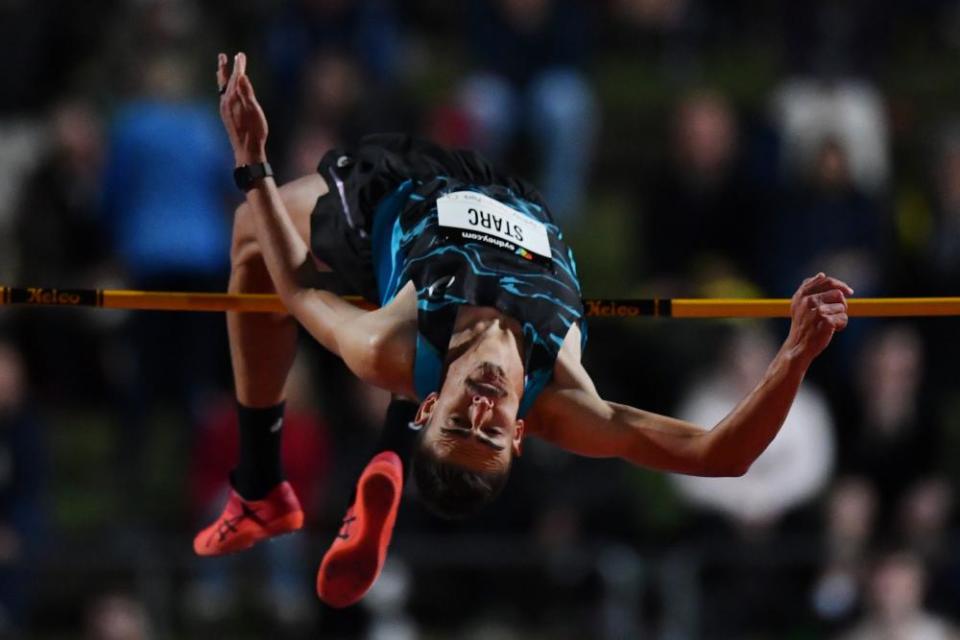
McDermott gazes out at an arena full of action: her male high jump counterpart Brandon Starc, a gold medallist at the 2018 Commonwealth Games, is trying to surpass the 2.33m Olympic qualifying height, while Matthew Denny – returning from injury – is attempting the same in the discus, searching for a 66m throw. Suddenly the crowd roars as the men’s para-ambulant 100m race begins, with Rio bronze medallist Chad Perris winning comfortably.
Earlier in the day Perris, who has albinism and is visually impaired, had been selected for the Paralympics (which use slightly different selection processes). “I’m going to be running really fast in Tokyo,” he says. “I’ll be up there fighting – that’s for sure.” Having had his selection confirmed, the sprinter ran the final without qualification concerns hanging over his head. “There’s no pressure for me here,” he adds. “But the job isn’t to be done in April, it’s to be done in late August.” After the race Perris is handed an over-size Qantas boarding pass to symbolise his ticket to Tokyo.
In the discus, Denny wins the national title with a throw of 63.88m, short of the Olympic qualifying distance. While automatic qualification may have eluded him, Denny is unfazed. “Qualifying isn’t the issue for me, I don’t think, but I need to get myself into shape for Tokyo,” he says. Australian selectors can nominate up to three competitors per Olympic event, subject to each athlete securing a qualifying result before the end of May or having a sufficient world ranking. That means in addition to 20 or so automatically-qualifying athletes (to be announced on Sunday night), another few dozen will still be picked before Tokyo – likely including Denny.
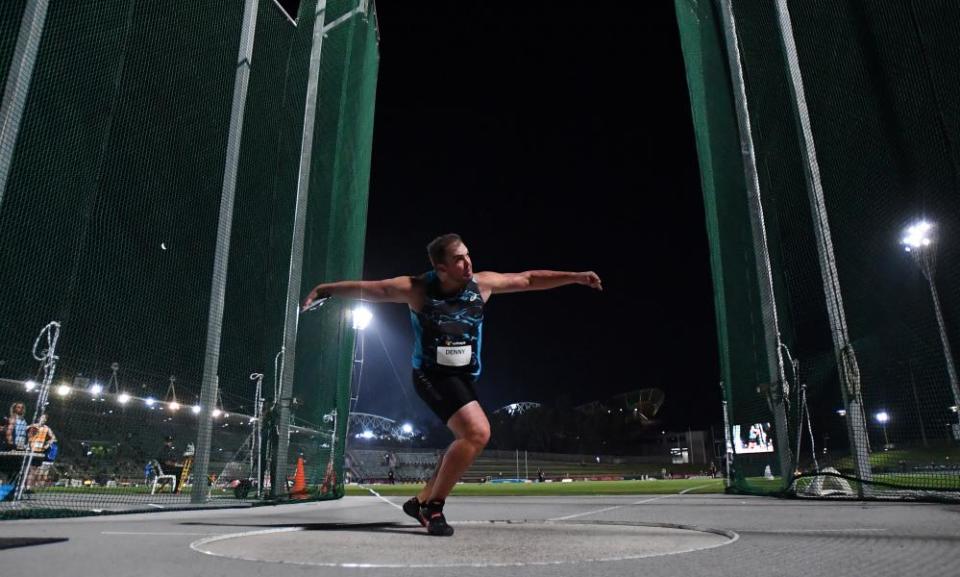
The discus thrower has the Olympic rings tattooed on his right bicep, having represented Australia in Rio. Still only 24, the Queenslander is another to have been buoyed by the recent news that Brisbane will likely host the 2032 Games. “I’ll be 34 then – that would be five Olympics,” he says. “You might have to wheel me out of here!”
In the meantime, Denny steps on to the podium with his national championships gold in hand – Covid protocols means he has to “self-medal”, putting it around his own neck, rather than the customary bow to receive it from a dignitary. “I shook some ghost’s hand,” he quips afterwards.
‘I don’t want to be a lane filler’
8.53pm: Men’s 100m
It has been an all-star evening of Australian athletics at Olympic Park. In the javelin, reigning world champion Kelsey-Lee Barber is upset by Kathryn Mitchell, while pole vault star Nina Kennedy fails to break her own Australian record with an unsuccessful attempt at 4.85m. In the men’s 800m, Nagmeldin “Peter” Bol – a South Sudanese refugee who received asylum in Australia when he was six – comfortably claims victory after a tactical first lap. Eventually, just one race remains on the schedule for the national championships’ penultimate night: the blue riband men’s 100m sprint.
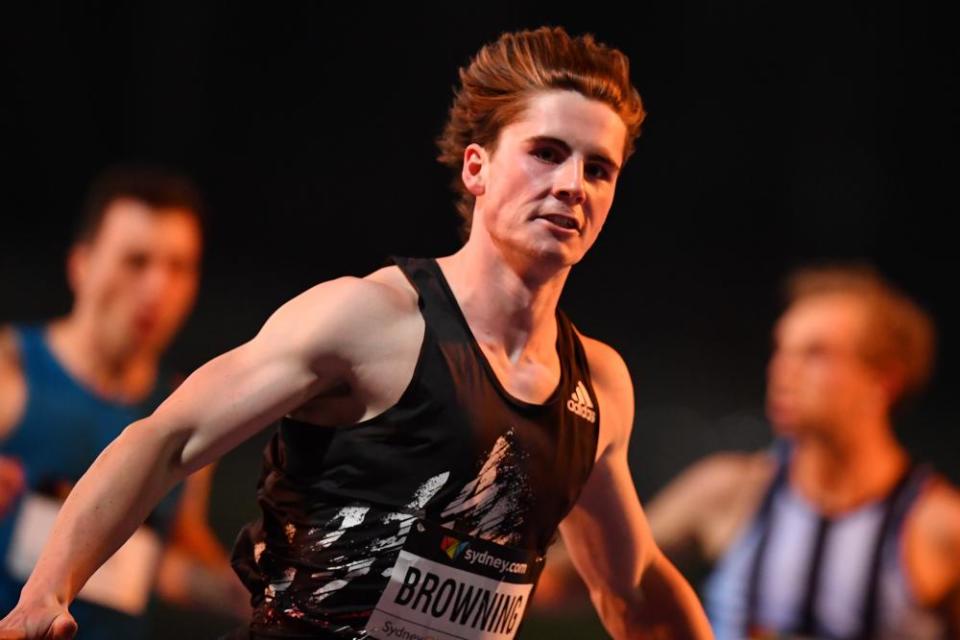
The fire machines blare flames, the lights dazzle and the fastest runners in Australia stride towards the track as boisterous spectators reach a crescendo. Suddenly, the crowd goes eerily silent. The temperature has dipped, giving the air a gentle chill. There is a collective holding of breath, before Rohan Browning bursts out of the blocks. The 23-year-old leads for the duration of the 10.09 seconds it takes him to claim the national title and confirm his place at the Tokyo Olympics. Given the cold and the absence of a tailwind, it is a remarkable time.
Related: ‘Prepare for the worst’: Australian Olympians await Covid-19 vaccine
An ecstatic Browning waves to the crowd, takes a long sip of beer (“the first one in a year – that’s the official position at least”) and kisses his girlfriend. “I’m pretty confident that if today was an Olympic heat or semi, I’d have a chance of going through to the final,” he says. “I have to run a bit quicker than 10.09 – I have to run 10.05 or under that, but it will be warmer than this in Tokyo and it’ll be the Olympics, so you’d expect a lift.”
The Sydney University law student will be Australia’s first representative in the men’s 100m since the 2004 Olympics. “This doesn’t feel like elation as much as it feels like meeting an expectation I set for myself at the start of the year,” Browning says. “I wanted to be the national champ, I wanted to get the automatic selection, I want to go to the Olympics, I want to make the final and be competitive. That’s what it’s all about – I don’t want to be a lane filler.” With those words of intent, Browning slips into the night and Australian athletics takes one step closer to the 2021 Olympics.

 Yahoo Sport
Yahoo Sport 





































